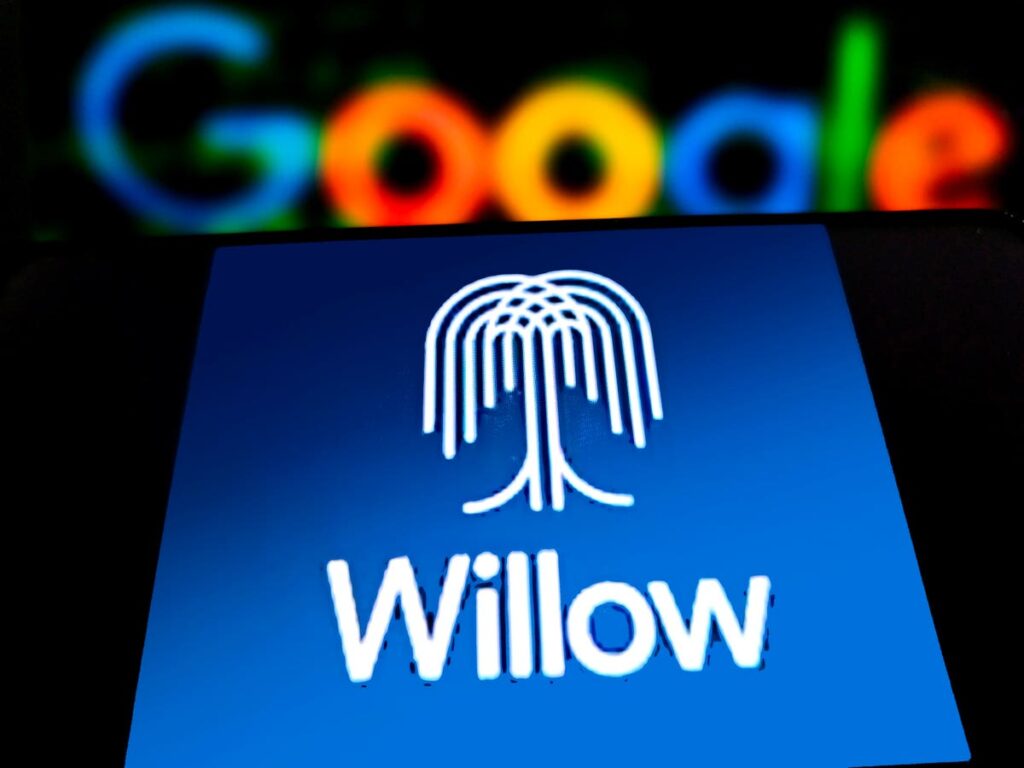Google Unveils Quantum Chip Willow. (Photo illustration by VCG/VCG via Getty Images)
In a groundbreaking announcement, Google unveiled its latest quantum computing chip, Willow, showcasing performance capabilities that vastly outstrip current hardware and potentially reshaping the competitive landscape for chip manufacturers.
The Willow quantum chip, developed by Google’s Quantum AI team, has demonstrated an astonishing leap in computational power. According to Google’s Quantum AI founder Hartmut Neven, Willow completed a benchmarking test in just five minutes – a task that would take today’s most advanced supercomputers an unfathomable 10 septillion years to solve. This mind-boggling performance not only pushes the boundaries of what we thought possible in computing but also raises profound questions about the nature of our universe.
Neven’s blog post went so far as to suggest that Willow’s extraordinary capabilities “lend credence to the notion that quantum computation occurs in many parallel universes, in line with the idea that we live in a multiverse.” While this claim has been met with a mix of excitement and skepticism in the scientific community, it underscores the revolutionary potential of quantum computing technology.
For industry analysts, the implications of Google’s breakthrough extend far beyond theoretical physics. The Willow chip represents a significant shift in the tech giants’ chip strategy, one that could reshape the competitive dynamics of the semiconductor industry in the coming years.
Traditionally, companies like NVIDIA have dominated the high-performance computing space with their advanced GPUs and AI accelerators. However, the quantum computing revolution threatens to disrupt this status quo. As quantum computers become more practical and scalable, they could potentially solve complex problems exponentially faster than classical computers, opening up new frontiers in drug discovery, financial modeling, and artificial intelligence.
This shift poses a long-term challenge to established players like NVIDIA. While NVIDIA has been making strides in quantum computing research – collaborating with companies like Rigetti Computing and Quantum Machines to develop AI-powered quantum computing solutions – Google’s Willow chip demonstrates the rapid pace of innovation in this field.
However, the quantum computing landscape is still in its early stages, and the race is far from over. While Google’s Willow chip represents a significant milestone, practical, large-scale quantum computers that can outperform classical computers on a wide range of tasks are still years away. This gives companies like NVIDIA time to adapt and potentially leverage their expertise in high-performance computing to carve out a strong position in the quantum era.
The quantum computing market is attracting significant investment, with startups in the sector raising $1.5 billion in venture funding so far in 2024, nearly doubling the previous year’s total, according to Crunchbase News. This influx of capital is fueling rapid innovation and could accelerate the timeline for practical quantum computing applications.
Governments are also taking notice, with the U.S. Senate proposing a $2.7 billion investment in quantum research and development over the next five years through the National Quantum Initiative Reauthorization Act, per a Quantum Insider report. This level of public and private investment underscores the strategic importance of quantum computing and the high stakes involved for tech companies.
For investors, the quantum computing revolution presents both opportunities and risks. While companies at the forefront of quantum research, like Google and IBM, may seem like obvious bets, it’s crucial not to overlook the potential of established players like NVIDIA to leverage their expertise and resources to compete effectively in this new paradigm.
As we stand on the brink of the quantum era, one thing is clear: the tech landscape is poised for a seismic shift. Google’s Willow chip is just the beginning, and we can expect to see intense competition and rapid innovation in the coming years as tech giants and startups alike race to harness the power of quantum computing.
For NVIDIA and other traditional chip manufacturers, the challenge will be to adapt quickly, leveraging their existing strengths while developing new capabilities in quantum technologies. Those that succeed in navigating this transition could find themselves well-positioned to thrive in a post-quantum world, while those that fail to adapt risk being left behind.
As we move forward, it will be crucial for investors, industry leaders, and policymakers to closely monitor developments in quantum computing. The technology’s potential to revolutionize industries ranging from pharmaceuticals to finance means that its impact will be felt far beyond the tech sector.
Google’s Willow chip represents more than just a technological breakthrough – it’s a precursor of the quantum revolution that’s set to reshape the tech industry. For companies like NVIDIA, the race is on to adapt and innovate in this new paradigm, ensuring they remain relevant in a future where quantum computing may well be the new standard for high-performance computation.


